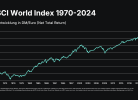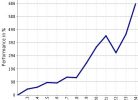By Mitch Zacks
At the beginning of 2021, there was broad consensus U.S. corporations would post a strong earnings’ rebound, and many believed interest rates would move higher alongside economic growth and rising inflation. Market participants set expectations for both outcomes.
Checking in a little more than halfway through the year, I think we can make two observations: earnings have been higher-than-expected, while interest rates continue to be lower-than-expected. If you’re looking for a succinct explanation for why the S&P 500 index is up close to 20% for the year, I think that’s it.
There are always many moving parts when it comes to analyzing the equity markets, of course, but the two factors I think that matter the most are earnings and interest rates. Everything else we see and read in the financial news—the good and the bad, the valued fundamental indicators and the noise—only matter, in my view, if they affect how earnings and/or interest rates will change in the future. The current situation in Afghanistan, for instance, may feel like a huge deal, but I see very little possibility of it affecting U.S. earnings or interest rates in 2021. To me, it is an important geopolitical event, but it has no pricing power.
On the other hand, when U.S. corporations are performing much better than most analysts expect them to, that does have pricing power. In this Q2 earnings cycle, revenue momentum has been particularly notable, with aggregate quarterly totals on track to reach an all-time high. The charts below show revenue growth rates and earnings and revenue beat percentages for companies that have reported so far, and the percentage of companies beating (right-hand side) really stands out. That’s what “better-than-expected” looks like.
Source: Zacks Investment Research
Many point out – correctly – that the strong revenue and earnings growth rates are due to the base effect, i.e., comparing Q2 2021 revenue to Q2 2020 revenue, when the economy was largely shut down. But even when we compare Q2 2021 earnings to Q2 2019 earnings, we find that corporations are on track to post earnings +30.9% higher than they were in 2019, pre-Covid. That is a very significant point that is not discussed often enough, in my view.
This largely better-than-expected performance from corporations has also resulted in upward revisions to Q3 earnings expectations, which started the year at 13.5% y-o-y growth and have since climbed to 26.2% y-o-y growth. This sustained optimism from corporate America comes even as the Delta variant is dealing a few setbacks to travel, hospitality, restaurant, and other in-person business operations. It’s a strong signal that companies feel able to navigate their way through the next few months.

On the interest rate front, everyone expected longer duration U.S. Treasury bonds to drift higher over the course of the year, and some even expected yields would spike as growth surged and inflation expectations went up. But so far, interest rates have been doing just the opposite. As you can see below in the chart of the 10-year and the 30-year U.S. Treasury bond yields, interest rates briefly drifted higher earlier in the year but have since fallen back.

Source: Federal Reserve Bank of St. Louis
When interest rates ultimately end up lower than everyone expects them to – as we saw in the first half of the year – stock prices usually rise. This time was no different.
Bottom Line for Investors
In my view, the stock market has performed well and reaching new all-time highs because aggregate earnings are coming in higher than expectations, while interest rates are far lower than expectations set earlier in the year. Positive surprises are great for stocks, in my view.
Looking ahead to the second half of the year, I think current expectations are that interest rates should eventually respond to higher inflation, while the corporate profit cycle has reached a peak and is likely poised to decelerate from here. Expecting higher rates and lower earnings may ultimately be a good thing, as it sets the stage for even more positive surprises.
Wenn du keinen Beitrag mehr verpassen willst, dann bestell doch einfach den Newsletter! So wirst du jedes Mal informiert, wenn ein neuer Beitrag erscheint!








